2. Book the Workshop
All SURT workshops must be booked at least three weeks prior to the date of training using the links below. If necessary, please contact surt-requests@bctf.ca, to establish the goals for the training, training topic(s), and dates.
An In-depth Look at the Role of Joint Health and Safety Committees
(4 hours)
 This workshop expands on Module 2 of the basic workshop. It looks at the duties and functions of the joint health and safety committee in the context of the four basic rights and of the general duties of employers, workers, and supervisors. Participants will discuss common difficulties committees face and will examine the effectiveness of their own committees.
This workshop expands on Module 2 of the basic workshop. It looks at the duties and functions of the joint health and safety committee in the context of the four basic rights and of the general duties of employers, workers, and supervisors. Participants will discuss common difficulties committees face and will examine the effectiveness of their own committees.
The Autonomous Professional
(3 hours)
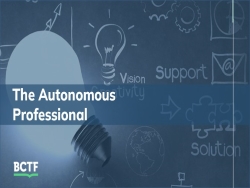 Participants become familiar with professional self-directed planning options that build and support teachers’ autonomy, professionalism, and collaboration. Participants will explore the differences between effective, teacher-directed PD, the "consumer model" of PD, and types of in-service, as well as some of the stumbling blocks to effective PD.
Participants become familiar with professional self-directed planning options that build and support teachers’ autonomy, professionalism, and collaboration. Participants will explore the differences between effective, teacher-directed PD, the "consumer model" of PD, and types of in-service, as well as some of the stumbling blocks to effective PD.
BC Blanket Exercise: Exploring Historical Relationships between Indigenous and non-Indigenous Peoples
(Up to 3 hours)
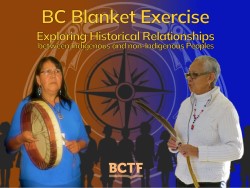 This experiential workshop will help participants understand how colonization of the land we now know as British Columbia and Canada has impacted the people who lived here long before settlers arrived. Through this exercise participants will explore the nation-to-nation relationship between Indigenous and non-Indigenous peoples in Canada, how this relationship has been damaged over the years, and how we can work toward reconciliation.
This experiential workshop will help participants understand how colonization of the land we now know as British Columbia and Canada has impacted the people who lived here long before settlers arrived. Through this exercise participants will explore the nation-to-nation relationship between Indigenous and non-Indigenous peoples in Canada, how this relationship has been damaged over the years, and how we can work toward reconciliation.
BCTF Code of Ethics: Understanding the Professional Relationship
(3 hours)
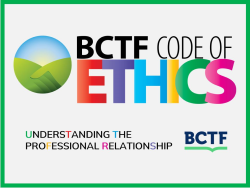 This workshop helps members understand professional and ethical behaviour as it relates to the BCTF Code of Ethics. It explores clauses, the rationale, and the processes for enforcement of and for dealing with alleged violations of the code. It defines the role of the Judicial Council and the role of local officers in promoting ethical conduct. Scenarios are used to promote discussion and to apply the Code of Ethics to members’ behaviours and situations.
This workshop helps members understand professional and ethical behaviour as it relates to the BCTF Code of Ethics. It explores clauses, the rationale, and the processes for enforcement of and for dealing with alleged violations of the code. It defines the role of the Judicial Council and the role of local officers in promoting ethical conduct. Scenarios are used to promote discussion and to apply the Code of Ethics to members’ behaviours and situations.
Capacity Building: Developing the School Leadership Team
(3 hours)
 Developing the knowledge, skills, and union-mindedness of the school-based team of teacher leaders (staff representatives, PD representatives, SJ representatives, staff committee chairpersons, health and safety representatives) is an important way to build capacity in the local. This workshop looks at practical ways to use the power of the team to support and advocate for members, create positive relationships in schools, and promote teacher education agendas. (Please note: this workshop should only be booked when bringing union representatives from all the leadership areas together.)
Developing the knowledge, skills, and union-mindedness of the school-based team of teacher leaders (staff representatives, PD representatives, SJ representatives, staff committee chairpersons, health and safety representatives) is an important way to build capacity in the local. This workshop looks at practical ways to use the power of the team to support and advocate for members, create positive relationships in schools, and promote teacher education agendas. (Please note: this workshop should only be booked when bringing union representatives from all the leadership areas together.)
Contract Awareness: Know Your Collective Agreement
(two 90-minute sessions)
 This revised workshop is designed to familiarize staff reps and the school union team with the restored collective agreement language following our Supreme Court of Canada win. The facilitator will guide participants through the local's restored language, then use case studies to show how the language will be applied at the school level. The role of the staff rep is discussed, showing the importance of the enforcement of the restored language plus any applicable remedies at the school level. This is a "hands-on" workshop so participants must bring copies of their collective agreement as well as copies of the local restored language.
This revised workshop is designed to familiarize staff reps and the school union team with the restored collective agreement language following our Supreme Court of Canada win. The facilitator will guide participants through the local's restored language, then use case studies to show how the language will be applied at the school level. The role of the staff rep is discussed, showing the importance of the enforcement of the restored language plus any applicable remedies at the school level. This is a "hands-on" workshop so participants must bring copies of their collective agreement as well as copies of the local restored language.
Creating a Culture of Professionalism
(3 hours)
 This workshop explores the ways local and school teams can and do lead on professional issues, develop ideas and practices around professional cultures, and seek ways to enhance and support the autonomous professional practices of teachers.
This workshop explores the ways local and school teams can and do lead on professional issues, develop ideas and practices around professional cultures, and seek ways to enhance and support the autonomous professional practices of teachers.
Creating Inclusive Spaces: Applying an Equity and Inclusion Lens to Your Local, Schools and Classrooms
(Up to 3 hours)
 Available as a SURT or PSI workshop. This workshop will provide teachers with strategies to help contribute to more inclusive environments. Participants will be introduced to a number of barriers to inclusion based on race, gender identity, sexual orientation, class and physical ability. They will then explore strategies and resources available on the BCTF Equity and Inclusion webpages to address these barriers. Through an inquiry model, participants will begin thinking about specific actions they can take in their classrooms, schools, locals, and communities.
Available as a SURT or PSI workshop. This workshop will provide teachers with strategies to help contribute to more inclusive environments. Participants will be introduced to a number of barriers to inclusion based on race, gender identity, sexual orientation, class and physical ability. They will then explore strategies and resources available on the BCTF Equity and Inclusion webpages to address these barriers. Through an inquiry model, participants will begin thinking about specific actions they can take in their classrooms, schools, locals, and communities.
Creating a Non-sexist Working Environment
(3 hours)
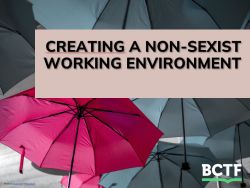 This workshop will explore the concepts of sex, gender, and gender identity. It will also delve into Article E.1 in our provincial collective agreement regarding a non-sexist working environment. We will review the responsibilities of the employer to uphold this article and explore steps to take when responding to violations of Article E.1.
This workshop will explore the concepts of sex, gender, and gender identity. It will also delve into Article E.1 in our provincial collective agreement regarding a non-sexist working environment. We will review the responsibilities of the employer to uphold this article and explore steps to take when responding to violations of Article E.1.
Drawing on Our Analytical Toolbox: Dealing with Difficult Issues
(3 or 5 hours)
 Do your staff reps and local executive need help analyzing the issues that are plaguing your local and schools? If so, this workshop will help members break down the parts of the issue so they can develop a plan of action that will help resolve issues at the school or local level. This workshop has a 3 hour version where the process is introduced. The 5 hour version gives participants hands-on experience analyzing an issue.
Do your staff reps and local executive need help analyzing the issues that are plaguing your local and schools? If so, this workshop will help members break down the parts of the issue so they can develop a plan of action that will help resolve issues at the school or local level. This workshop has a 3 hour version where the process is introduced. The 5 hour version gives participants hands-on experience analyzing an issue.
Education Change: The Big Picture
(3 hours)
 This revised workshop looks at educational change through several lenses including:
This revised workshop looks at educational change through several lenses including:
- curriculum—what we teach
- our pedagogy—how we teach, assessment, and reporting
- political imperatives—such as Aboriginal Education, inclusion
- technology—the tools we use change what we do
- and contract negotiations—creating a different frame.
Participants will engage in activities that assess educational change initiatives in education using the lenses of students' learning, our ability to incorporate proposed changes in the classroom, and the overall benefits to public education.
Engaging, Inclusive, and Productive Meetings
(3 hours)
 This workshop will help participants to understand the rules and conventions of meetings. They will also learn about how participation in decision-making can be made more inclusive, and the importance of meaningful territorial acknowledgements.
This workshop will help participants to understand the rules and conventions of meetings. They will also learn about how participation in decision-making can be made more inclusive, and the importance of meaningful territorial acknowledgements.
Content includes the rules of order, inclusive meeting norms, agenda setting, principles of parliamentary process, preparing for and running successful meetings, as well as tips on chairing, motions, and minutes. Topics of specific interest to locals or participants can also be included.
Ergonomics
(3 hours)
 British Columbia is one of only a few jurisdictions in the world that has comprehensive workplace ergonomics regulations. This workshop provides basic information about ergonomics and looks at the ergonomics requirements in the Occupational Health and Safety Regulation. Participants will learn: how to identify ergonomic problems in their workplaces, some risk assessment techniques, and some effective control measures that can be implemented to reduce the risk to workers of musculoskeletal injuries.
British Columbia is one of only a few jurisdictions in the world that has comprehensive workplace ergonomics regulations. This workshop provides basic information about ergonomics and looks at the ergonomics requirements in the Occupational Health and Safety Regulation. Participants will learn: how to identify ergonomic problems in their workplaces, some risk assessment techniques, and some effective control measures that can be implemented to reduce the risk to workers of musculoskeletal injuries.
Having Conversations
(This workshop is delivered over two 90-minute sessions when booked)
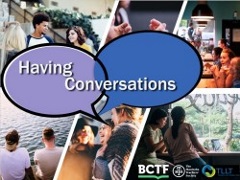
Collaborative work can be fraught with challenges: time is wasted, goodwill is lost, and environments that should be productive become unsafe. However, when groups change the way they talk, they change the way they work together. This workshop will examine how we can all improve our communication skills by paying attention to our conversations, and in turn help us enhance our work with colleagues, students, and parents.
We wish to thank Danielle Fullan Kolton and the Manitoba Teachers’ Society for their permission to use these workshop materials.
Incident Investigations and Reports
(2 hours)
 The legal requirements of incident investigations and reporting will be reviewed in this session. Various types of incidents and causes of incidents will be discussed. Participants will proceed through the stages of investigation—necessary facts, investigative tools, visiting the scene, interviewing, and evaluating.
The legal requirements of incident investigations and reporting will be reviewed in this session. Various types of incidents and causes of incidents will be discussed. Participants will proceed through the stages of investigation—necessary facts, investigative tools, visiting the scene, interviewing, and evaluating.
Incident Reporting
(3 hours)
 Dr. Jennifer Newman, a workplace psychologist, states that workplaces should have zero harm policies. Harm is preventable and unacceptable. All incidents must be reported and investigated to take steps to prevent further injuries or an exacerbation of injuries. The most important incidents to report are the near misses so that whatever caused the near miss is eliminated or controlled and does not cause a more serious accident or injury. This workshop will cover what should be reported, how to report, and what should come from reporting.
Dr. Jennifer Newman, a workplace psychologist, states that workplaces should have zero harm policies. Harm is preventable and unacceptable. All incidents must be reported and investigated to take steps to prevent further injuries or an exacerbation of injuries. The most important incidents to report are the near misses so that whatever caused the near miss is eliminated or controlled and does not cause a more serious accident or injury. This workshop will cover what should be reported, how to report, and what should come from reporting.
Inquiry for Teachers - Exploring the Process
(3 or 5 hours)
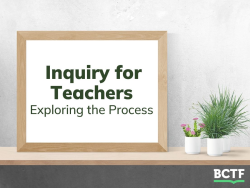 This workshop is designed to inform participants about teacher inquiry for professional development. It is intended to support locals in advocating, developing, and implementing teacher inquiry in their district by providing them with examples, suggestions, and resources. Participants will be introduced to the BCTF Teacher Inquiry program, delve into principles of the inquiry process, and have time to strategize and plan for a locally developed and organized inquiry project.
This workshop is designed to inform participants about teacher inquiry for professional development. It is intended to support locals in advocating, developing, and implementing teacher inquiry in their district by providing them with examples, suggestions, and resources. Participants will be introduced to the BCTF Teacher Inquiry program, delve into principles of the inquiry process, and have time to strategize and plan for a locally developed and organized inquiry project.
Investigations and Discipline: Knowledge is Power
(3 hours)
 The workshop focuses on investigations at the local level and moves to investigations and discipline at the Teacher Regulation Branch (TRB) level. Progressive discipline is discussed in the workshop. The school staff rep’s role in investigations is featured in this presentation.
The workshop focuses on investigations at the local level and moves to investigations and discipline at the Teacher Regulation Branch (TRB) level. Progressive discipline is discussed in the workshop. The school staff rep’s role in investigations is featured in this presentation.
Is it a Grievance? Problem-solving at the School Level
(3 hours)
 This workshop gives union representatives an understanding of the grievance procedure for solving disputes. Participants learn their role in grievance handling and enhance their skill in helping colleagues resolve problems at the school level. Participants must bring a copy of their collective agreement in order to examine issues of local or school concern.
This workshop gives union representatives an understanding of the grievance procedure for solving disputes. Participants learn their role in grievance handling and enhance their skill in helping colleagues resolve problems at the school level. Participants must bring a copy of their collective agreement in order to examine issues of local or school concern.
Joint Health and Safety Committees/Worker Representatives
(3 hours)
 The provisions of the Workers Compensation Act will be reviewed. Scenarios and discussion of duties and responsibilities, including committee terms of reference, will be included. Participants will go over successful strategies for effective committees, including organization of meetings and reporting responsibilities.
The provisions of the Workers Compensation Act will be reviewed. Scenarios and discussion of duties and responsibilities, including committee terms of reference, will be included. Participants will go over successful strategies for effective committees, including organization of meetings and reporting responsibilities.
Managing Conflict
(3 hours)
 Conflict is inevitable in groups, but it does not need to cause division and animosity if it is managed effectively. This workshop gives participants an insight into their own conflict management styles, and gives some practice in effective conflict management and communication skills. The workshop also provides information about the mediation services available from the BCTF. This workshop is not conflict resolution, but conflict management, focusing on skills to ensure that conflicts do not escalate.
Conflict is inevitable in groups, but it does not need to cause division and animosity if it is managed effectively. This workshop gives participants an insight into their own conflict management styles, and gives some practice in effective conflict management and communication skills. The workshop also provides information about the mediation services available from the BCTF. This workshop is not conflict resolution, but conflict management, focusing on skills to ensure that conflicts do not escalate.
New Teachers: Learning about the BCTF and Your Local
(3 hours)
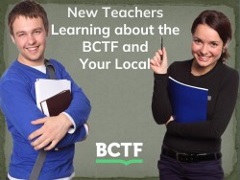
This workshop introduces new members to collective agreements and highlights sections most relevant to them. It also educates new members on BCTF services and their health and safety rights.
Occupational Health and Safety (OH&S) Program Overview
(3 hours)
 School health and safety issues will be reviewed in the context of the workplace and necessary policies and procedures. The basic elements of an OH&S program are covered. Sample or actual school district policies and procedures will be reviewed.
School health and safety issues will be reviewed in the context of the workplace and necessary policies and procedures. The basic elements of an OH&S program are covered. Sample or actual school district policies and procedures will be reviewed.
Occupational Health & Safety Training for New Committee Members and Worker Reps
(3 hours)
 This workshop is designed for new members of Joint Occupational Health and Safety Committees in their first six months on a committee. Effective April 3, 2017, Worksafe BC regulations require all new members of committees and worker reps to receive 8 hours of instruction on prescribed health and safety topics (OHSR 3.27) . This workshop satisfies that requirement. The content of the workshop also serves as a good back-to-basics refresher for committee people, or as a SURT.
This workshop is designed for new members of Joint Occupational Health and Safety Committees in their first six months on a committee. Effective April 3, 2017, Worksafe BC regulations require all new members of committees and worker reps to receive 8 hours of instruction on prescribed health and safety topics (OHSR 3.27) . This workshop satisfies that requirement. The content of the workshop also serves as a good back-to-basics refresher for committee people, or as a SURT.
Note: The training prescribed for new committee people is outside of the 8 hour education educational leave entitled under Part3, Division 4, Section 135 of the Workers’ Compensation Act.
Organizing and Mobilizing for Change
(3 hours)
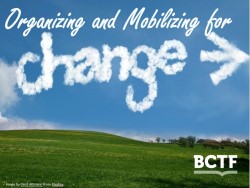
This new workshop builds on participants’ own inspirations. How organizing and mobilizing differ is explained, and why both are needed for effective member engagement and action. The workshop covers how to build a campaign and shows how teachers already do this work. Examples of effective organizing and mobilizing are provided, and participants will learn why inclusivity matters. Participants will make a plan for organizing and mobilizing, based on their own interests.
Preparing for Local Bargaining
(3 hours)

This new workshop will begin to prepare the local bargaining team with strategies and skills for local negotiations. Participants will understand the process of developing contract language and the importance of good notetaking. This workshop will also review the roles and responsibilities of each member of the bargaining team.
Professional Boundary Issues: Teacher/Student Relationships
(3 hours)
 Sometimes the standards of conduct between students and teachers are ambiguous. Teachers place themselves in jeopardy when boundaries are crossed. This workshop helps school staffs and TTOCs identify the boundaries and provides them with support and resources. Reference will be made to the BCTF Code of Ethics.
Sometimes the standards of conduct between students and teachers are ambiguous. Teachers place themselves in jeopardy when boundaries are crossed. This workshop helps school staffs and TTOCs identify the boundaries and provides them with support and resources. Reference will be made to the BCTF Code of Ethics.
Refusal of Unsafe Work
(3 hours)
 No worker is required to enter a work situation that they reasonably believe puts them at undue risk of harm. This workshop navigates the refusal process as per regulation and applies it to the school setting. Scenarios and examples will be reviewed in order for participants to understand the kinds of circumstances under which refusal may occur.
No worker is required to enter a work situation that they reasonably believe puts them at undue risk of harm. This workshop navigates the refusal process as per regulation and applies it to the school setting. Scenarios and examples will be reviewed in order for participants to understand the kinds of circumstances under which refusal may occur.
Role and Function of the PD Rep
(3 or 5 hours)
 This updated workshop develops the skills and knowledge of the PD chairs as a union leader using the PD lens as a strategic tool. Strategies are explored for building member and public support for professional development, advocating for teacher-centered PD, and returning control of PD to teachers.
This updated workshop develops the skills and knowledge of the PD chairs as a union leader using the PD lens as a strategic tool. Strategies are explored for building member and public support for professional development, advocating for teacher-centered PD, and returning control of PD to teachers.
Role and Function of the School Site Health and Safety Rep
(3 hours)
 The School based health and safety rep is more than just another body around the Joint Occupational Health and Safety committee table. This workshop explores the role of the health and safety rep from the union activist perspective. The Health and safety rep is an advocate, an advisor, and an assistant. This workshop explains these roles and how they fit in the union role.
The School based health and safety rep is more than just another body around the Joint Occupational Health and Safety committee table. This workshop explores the role of the health and safety rep from the union activist perspective. The Health and safety rep is an advocate, an advisor, and an assistant. This workshop explains these roles and how they fit in the union role.
Role of the Staff Rep
(3 hours)
 This workshop will prepare your staff reps for their work with members in schools. Staff reps should not feel that they are alone in doing this work in the school. They will learn about their rights as a staff rep, learn how to represent members in initial conversations with school administrators, and become familiar with the format and content of the provincial and local collective agreement. This workshop will also discuss how to establish a network of support at the school and local level. Facilitators will use strategies such as role-playing, problem solving, and discussion to guide participants through all aspects of their role as staff reps.
This workshop will prepare your staff reps for their work with members in schools. Staff reps should not feel that they are alone in doing this work in the school. They will learn about their rights as a staff rep, learn how to represent members in initial conversations with school administrators, and become familiar with the format and content of the provincial and local collective agreement. This workshop will also discuss how to establish a network of support at the school and local level. Facilitators will use strategies such as role-playing, problem solving, and discussion to guide participants through all aspects of their role as staff reps.
Safety Inspections
(3 hours)
 This module reviews the pre-inspection, inspection, and post-inspection stages. School-related checklists and other materials are used. Participants will learn how to identify hazards during safety inspections. Pictures of school activities will be used as a basis of discussion.
This module reviews the pre-inspection, inspection, and post-inspection stages. School-related checklists and other materials are used. Participants will learn how to identify hazards during safety inspections. Pictures of school activities will be used as a basis of discussion.
The School-Based Team and the Restored Collective Agreement
(5 hours)
 With the Supreme Court of Canada win, and the restoration of the stripped collective agreement language, many locals are finding that their school-based teams can now operate with language that restores a great deal of influence and decision making. However, the restored language is unfamiliar to the majority of teachers who have become accustomed to working within the stripped language. This 4 hour workshop will discuss the importance of “unlearning” past school-based team practices and the ministry designations for students with special needs. Participants will discuss the implications of the local’s restored language and develop guidelines to ensure the language is being followed.
With the Supreme Court of Canada win, and the restoration of the stripped collective agreement language, many locals are finding that their school-based teams can now operate with language that restores a great deal of influence and decision making. However, the restored language is unfamiliar to the majority of teachers who have become accustomed to working within the stripped language. This 4 hour workshop will discuss the importance of “unlearning” past school-based team practices and the ministry designations for students with special needs. Participants will discuss the implications of the local’s restored language and develop guidelines to ensure the language is being followed.
School Goal Setting
(3 hours)
 This workshop is for school staffs or other intact groups, like school departments wanting to explore and establish their vision and goals for their work. Participants will identify, share, and develop action plans in a collegial and supportive atmosphere.
This workshop is for school staffs or other intact groups, like school departments wanting to explore and establish their vision and goals for their work. Participants will identify, share, and develop action plans in a collegial and supportive atmosphere.
Union Mentorship
(3 hours)
 In this workshop participants will explore the advantages of developing a local mentorship program for all members, particularly members from equity-seeking groups. Participants will discuss how to create a respectful and deliberate way to share information, support each other, develop leadership and confidence, and how to be open to new ideas and ways of doing things that are essential to this process of renewal. Addressing barriers to leadership opportunities by developing knowledge and understanding makes our Federation more inclusive and encourages the next generation of activists.
In this workshop participants will explore the advantages of developing a local mentorship program for all members, particularly members from equity-seeking groups. Participants will discuss how to create a respectful and deliberate way to share information, support each other, develop leadership and confidence, and how to be open to new ideas and ways of doing things that are essential to this process of renewal. Addressing barriers to leadership opportunities by developing knowledge and understanding makes our Federation more inclusive and encourages the next generation of activists.
Violence in the Workplace
(3 hours)
 Workplace violence is becoming a growing concern in the education sector. Every year, an increasing number of workers in schools are victims of threats and violence in the performance of their jobs. This workshop explores the definition of violence, types of violence, and what is required to assess and plan to eliminate or reduce risks. The workshop discussions include risk assessment, safety plans, privacy issues, and the right to know, all with a focus on keeping workers safe.
Workplace violence is becoming a growing concern in the education sector. Every year, an increasing number of workers in schools are victims of threats and violence in the performance of their jobs. This workshop explores the definition of violence, types of violence, and what is required to assess and plan to eliminate or reduce risks. The workshop discussions include risk assessment, safety plans, privacy issues, and the right to know, all with a focus on keeping workers safe.
Violence Prevention
(3 hours)
 This workshop reviews the WCB section on violence protection. Emphasis is on completing a risk assessment and on processing reports of violence, up to and including a WCB claim. In addition, the workshop discusses the law on the release of a student’s history of violence in the context of a violence protection program.
This workshop reviews the WCB section on violence protection. Emphasis is on completing a risk assessment and on processing reports of violence, up to and including a WCB claim. In addition, the workshop discusses the law on the release of a student’s history of violence in the context of a violence protection program.